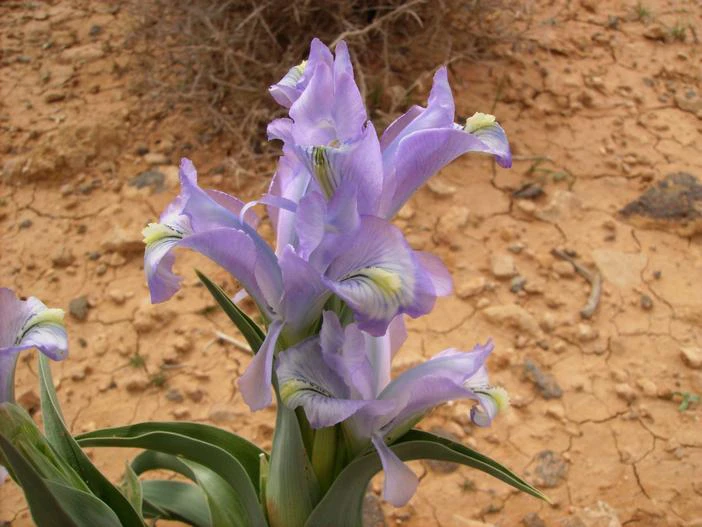Aucher-Éloy Iris
(Iris aucheri)
Aucher-Éloy Iris (Iris aucheri)
/
/

Anas A. Emad
CC BY-SA 4.0
Image By:
Anas A. Emad
Recorded By:
Copyright:
CC BY-SA 4.0
Copyright Notice:
Photo by: Anas A. Emad | License Type: CC BY-SA 4.0 | License URL: https://creativecommons.org/licenses/by-sa/4.0 | Uploader: Anas Emad | Publisher: Wikipedia Commons






Estimated Native Range
Climate Requirements for Fish Hawk, Florida
| This Plant | Your Site | Plant Suitability for Your Location | ||
|---|---|---|---|---|
| • Precipitation | 6" - 47" | 50" | Aquatic | Aquatic |
| • High Temp. | 85°F - 112°F | 91°F | Your summer temperatures are normal for this plant. | Excellent |
| • Low Temp. | 19°F - 47°F | 49°F | OK, but your winter temperatures are warmer than normal for this plant | OK |
This plant may not grow well at your location - your precipitation is too high.
Summary
Iris aucheri, commonly known as Aucher-Éloy Iris, is a deciduous perennial bulb native to rocky and stony slopes in the Middle East, specifically in Turkey, Iran, Iraq, Syria, and the Transcaucasus region. It reaches a modest height of about 25 cm (10 inches) and features crowded lanceolate leaves. The plant produces several fragrant flowers in late winter or early spring, which can be white, pale blue, or dark blue, each with a distinctive yellow splash on the falls, contributing to its ornamental value.
The Aucher-Éloy Iris is appreciated for its showy, violet-scented flowers and is often cultivated in rock gardens, borders, and as underplanting for deciduous trees. It thrives in neutral to slightly alkaline soil and requires a sheltered position to protect it from severe frost. While it can be grown outdoors in USDA Zone 6, it benefits from winter protection or cultivation in an unheated greenhouse or conservatory in cooler climates. The Royal Horticultural Society has recognized it with the Award of Garden Merit, indicating its excellence for garden use. For optimal growth, it should be planted in full sun with medium water requirements and well-drained soil. It is relatively low-maintenance but should be monitored for common bulb diseases and pests.CC BY-SA 4.0
The Aucher-Éloy Iris is appreciated for its showy, violet-scented flowers and is often cultivated in rock gardens, borders, and as underplanting for deciduous trees. It thrives in neutral to slightly alkaline soil and requires a sheltered position to protect it from severe frost. While it can be grown outdoors in USDA Zone 6, it benefits from winter protection or cultivation in an unheated greenhouse or conservatory in cooler climates. The Royal Horticultural Society has recognized it with the Award of Garden Merit, indicating its excellence for garden use. For optimal growth, it should be planted in full sun with medium water requirements and well-drained soil. It is relatively low-maintenance but should be monitored for common bulb diseases and pests.CC BY-SA 4.0
Plant Description
- Plant Type: Bulb
- Height: 0.5-1.5 feet
- Width: 0.5-1.5 feet
- Growth Rate: Moderate
- Flower Color: Blue, Purple, White
- Flowering Season: Winter, Spring
- Leaf Retention: Deciduous
Growth Requirements
- Sun: Full Sun
- Water: Medium
- Drainage: Medium, Fast
Common Uses
Bee Garden, Bird Garden, Border Plant, Butterfly Garden, Deer Resistant, Drought Tolerant, Fragrant, Hummingbird Garden, Low Maintenance, Rabbit Resistant, Rock Garden, Salt Tolerant, Showy Flowers
Natural Habitat
Rocky and stony slopes in the Middle East, specifically in Turkey, Iran, Iraq, Syria, and the Transcaucasus region
Other Names
Common Names: Iris Aucheri
Scientific Names: Iris aucheri, Iris fumosa, Iris sindjarensis, Iris aucheri var. fumosa, Iris assyriaca, Juno aucheri, Juno fumosa, Juno sindjarensis, Thelysia fumosa
GBIF Accepted Name: Iris aucheri (Baker) Sealy